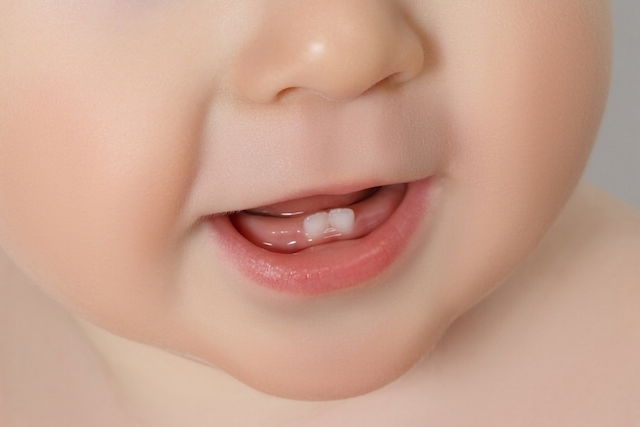Teething symptoms in babies can include irritability, excessive drooling and red gums. These generally emerge at around 6 months of age, which is when the first teeth tend to erupt.
Generally, symptoms are mild and do not require any specific treatment. You can relieve any discomfort by gently massaging the gums and offering teething toys.
It is important to have the baby assessed by a doctor if symptoms like fever and diarrhea occur, as they may be related to other health conditions that require a more targeted treatment.

Main symptoms
The main symptoms of teething in babies are:
- Agitation and irritability throughout the day
- Excessive drooling
- Swollen and red gums
- Biting on objects
- Sucking fingers
- Rubbing gums
- Difficulty eating
- Lack of appetite
- Difficulty sleeping
- Increased core temperature
Other symptoms, like diarrhea, runny nose, red spots on the face or fever can also occur during this time. However these symptoms should be evaluated by a pediatrician, as they can indicate another health condition, like a cold or gastroenteritis.
When does do babies get their first teeth?
Baby teeth start to erupt between 6 and 8 months, with the bottom two front teeth being the first to emerge. The order in which teeth grow, however, can vary due to genetics. Some babies may even be born with teeth in place already.
What to do when the baby’s first teeth grow
The growth of a baby’s first teeth are a normal of health development in babies. Symptoms during this time tend to be mild and do not require any specific treatment.
Babies presenting with discomfort or irritability can be soothed with gentle gum massages with your fingertips, and with teething toys. Babies with hardened gums can be given raw vegetables, like a cold carrot, to chew on (with full supervision by an adult to reduce choking hazards).
If you notice that the baby’s chin is becoming reddened and irritated from the drooling, you can apply a moisturizing cream as guided by your pediatrician. Symptoms like fever and diarrhea should be assessed by a pediatrician for further evaluation, as treatment with fever meds or antibiotics may be needed.
How to care for baby’s first teeth
Brushing with baby-safe, fluoride toothpaste is recommended as soon as the first teeth erupt. This will help to promote healthy growth.
It is important to use a soft toothbrush and to brush lightly to avoid gum damage.






























